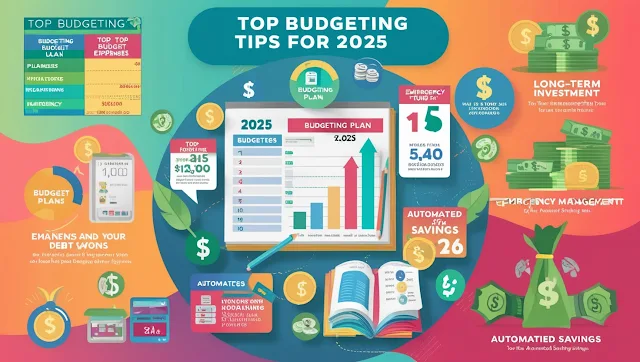Top Budgeting Tips for 2025
In 2025, managing your finances effectively is crucial. With the new year come new financial challenges, and a strong budget plan can help you handle them. In this article, we will discuss top budgeting tips to improve your financial health.
1. Why Budgeting is Essential in 2025
Financial Challenges in 2025
The financial world is constantly evolving in 2025. Factors such as inflation, interest rates, and market volatility make budgeting a critical step for achieving financial stability.
Benefits of Budgeting
Budgeting allows you to track your income and expenses, control unnecessary spending, increase savings, and achieve your financial goals. Without a good budget, financial planning is incomplete.
2. Creating a Budget Plan
Assessing Your Current Financial Situation
First, it's essential to assess your current financial situation. Make a list of your income sources and monthly expenses. This will help you understand where your money is coming from and where it is going.
Setting SMART Financial Goals
Set SMART (Specific, Measurable, Achievable, Relevant, Time-bound) financial goals. These goals will give you clear direction and motivation.
Using Budgeting Tools and Apps
In the digital era, multiple budgeting tools and apps are available that can help you create and track your budget. These tools can help you manage your finances effectively.
3. Effective Budgeting Strategies
he 50/30/20 Rule
This popular budgeting rule divides your income into three categories: 50% for needs, 30% for wants, and 20% for savings and debt repayment. This rule is simple and effective.
Tracking Expenses
It's essential to track your daily expenses. This helps you identify where you are overspending and where you can cut down.
Cutting Unnecessary Expenses
Identify and cut down unnecessary expenses such as subscription services you don't use, dining out, etc.
4. Building an Emergency Fund
Importance of an Emergency Fund
An emergency fund is a financial cushion that covers unexpected expenses. It protects you from financial stress and provides stability.
How to Start Saving for Emergencies
Save a portion of your monthly income in an emergency fund. Experts suggest saving at least 3-6 months' worth of living expenses in an emergency fund.
5. Managing Debt
Strategies for Debt Reduction
Managing debt is crucial for financial health. Use methods like the snowball or avalanche methods to prioritize and systematically pay off your debt.
Prioritizing High-Interest Debt
Clear high-interest debt first as it puts a significant burden on your finances. Once high-interest debts are clear, tackle low-interest debts.
6. Investing for the Future
Importance of Long-Term Investments
Long-term investments help grow your wealth. These investments provide a shield against market fluctuations.
Diversifying Your Portfolio
A diversified investment portfolio reduces risk. Invest in different asset classes like stocks, bonds, mutual funds, etc.
7. Automating Savings
Benefits of Automated Savings
Automated savings allow you to save regularly without extra effort. This reinforces your savings habit.
How to Set Up Automatic Transfers
Set up automatic transfers through your bank. You can transfer money from your account to your savings account on a fixed date.
8. Reviewing and Adjusting Your Budget
Regularly Reviewing Your Budget
It's essential to regularly review your budget. This helps you understand what is working and what isn't.
Making Adjustments as Needed
Financial situations change, so adjust your budget as necessary. Flexibility is key.
conclusion:
Budgeting is a continuous process that requires regular review and adjustment. By foll
owing these tips, you can take control of your finances and achieve your financial goals in 2025.






.webp)
.jpeg)
